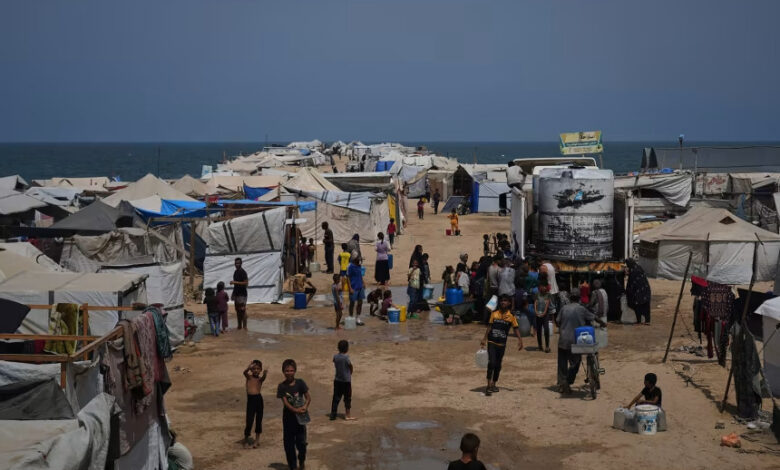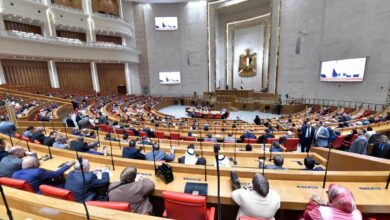
Egypt is preparing for the transitional period that is expected to begin following a ceasefire in the Gaza Strip, including the issue of a temporary administration for the besieged territory. These preparations are happening as discussions continue in Cairo. An informed Egyptian source confirmed that Major General Hassan Rashad, head of the General Intelligence Service, met with a Hamas delegation to discuss ways to advance truce negotiations.
The source told Al-Qahera News that during the meeting, Hamas expressed its eagerness to quickly return to ceasefire negotiations and praised Egypt’s efforts to deliver aid to Gaza and its residents. The source noted that Egypt is intensifying its contacts with all parties to achieve a de-escalation, paving the way for an end to the war.
Meanwhile, Arab news reports have referenced a comprehensive Egyptian ceasefire proposal expected to take effect by the end of the current month. Egypt believes there is a limited window of opportunity to reach an agreement. According to Al-Masry Al-Youm, informed sources said that Cairo has invited Palestinian factions and the Palestine Liberation Organization (PLO) to discuss the comprehensive deal and the names proposed to lead the temporary administration.
According to the sources, Cairo supports the Palestinian figures being put forward for the task of a temporary administration during the transitional phase.
The agreement, to be implemented in two phases, includes:
- Ending the war and ensuring the return of all captives.
- Establishing a temporary administration for the Gaza Strip led by international and Arab forces.
- A commitment from Hamas to a long-term ceasefire and a freeze on all activities of its military wing during the transitional period.
- Hamas ceasing the manufacturing and smuggling of weapons into Gaza, while committing to a framework for the future of Gaza’s weapons.
NGOs raise alarm over new Israeli rules for Gaza aid
More than 100 non-governmental organizations (NGOs) expressed their concern in a joint letter published Thursday over new Israeli rules regulating the work of foreign aid groups. These rules are reportedly being used to reject requests to bring supplies into the Gaza Strip. According to the letter, which was signed by organizations like Oxfam and Doctors Without Borders, at least 60 requests for aid to Gaza were rejected in July alone. Israeli authorities have stated that these organizations are not authorized to deliver aid.
Last March, the Israeli government approved new rules for foreign NGOs working with Palestinians. These rules include provisions that allow for the rejection of requests or the cancellation of an organization’s registration, particularly if it is deemed to “deny the democratic character of Israel or promote campaigns to delegitimize the country.”
Gaza’s humanitarian crisis deepens
On the ground, the Gaza Ministry of Health has announced four deaths from famine and malnutrition in the past 24 hours, bringing the total number of victims of the famine to 239, including 106 children. Medical sources in the Strip’s hospitals reported 16 deaths from Israeli airstrikes that targeted various areas since Thursday morning. Five of the victims were people who were waiting for aid.
For the past four days, Israeli forces have continued concentrated bombing operations in the southern neighborhoods of Gaza City, particularly in the Al-Zaytoun neighborhood, which is the largest district by area and the second largest by population.
The spokesperson for the Gaza Civil Defense, Mahmoud Basal, stated that Israeli forces have destroyed approximately 300 buildings in the neighborhood over the past three days. Dozens of casualties have not been reached because ambulances and civil defense vehicles are being prevented from entering the area.
Israel’s long-term operation
In a separate development, Chief of Staff of the Israeli army, Eyal Zamir, has approved the core concept for the occupation of Gaza City in the northern Strip. Discussions on the plan are expected to continue over the next two weeks. Zamir noted that it would be impossible to implement this plan without mobilizing reserve soldiers, with the pace of advancement expected to be slow, lasting at least several months.
According to the preliminary framework, the comprehensive operation would require the mobilization of between 80,000 and 100,000 reserve soldiers as part of the “Eighth Army.” The maneuvers in Gaza and the northern Strip are expected to continue into 2026. Separately, the head of the American humanitarian organization ANERA told Arab media that the Israeli army is creating obstacles to the entry of humanitarian aid into the Gaza Strip, making it more difficult to provide support to affected civilians.




